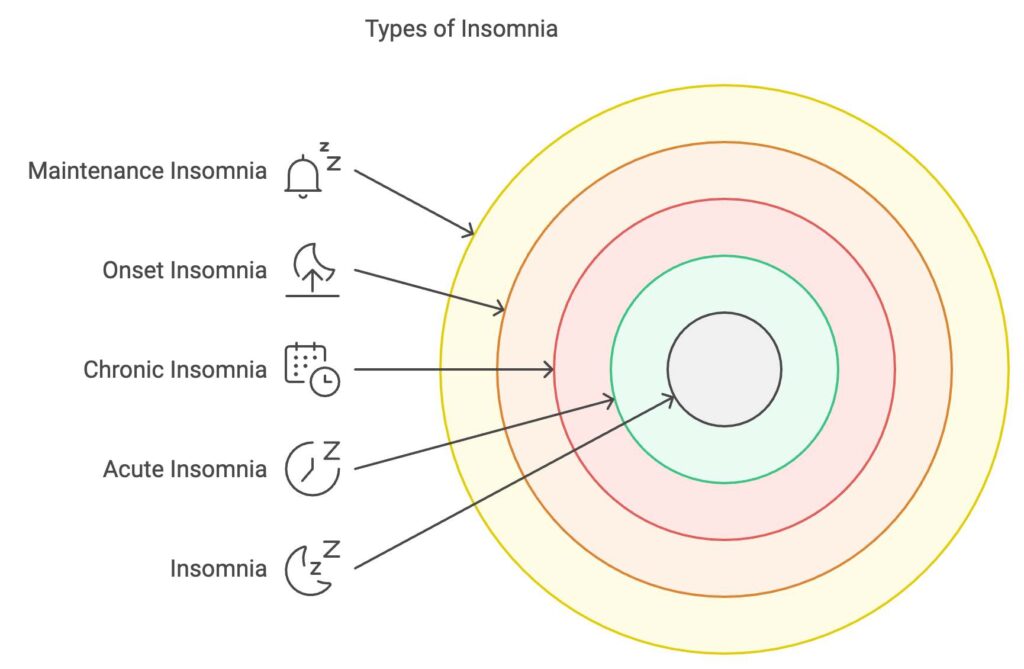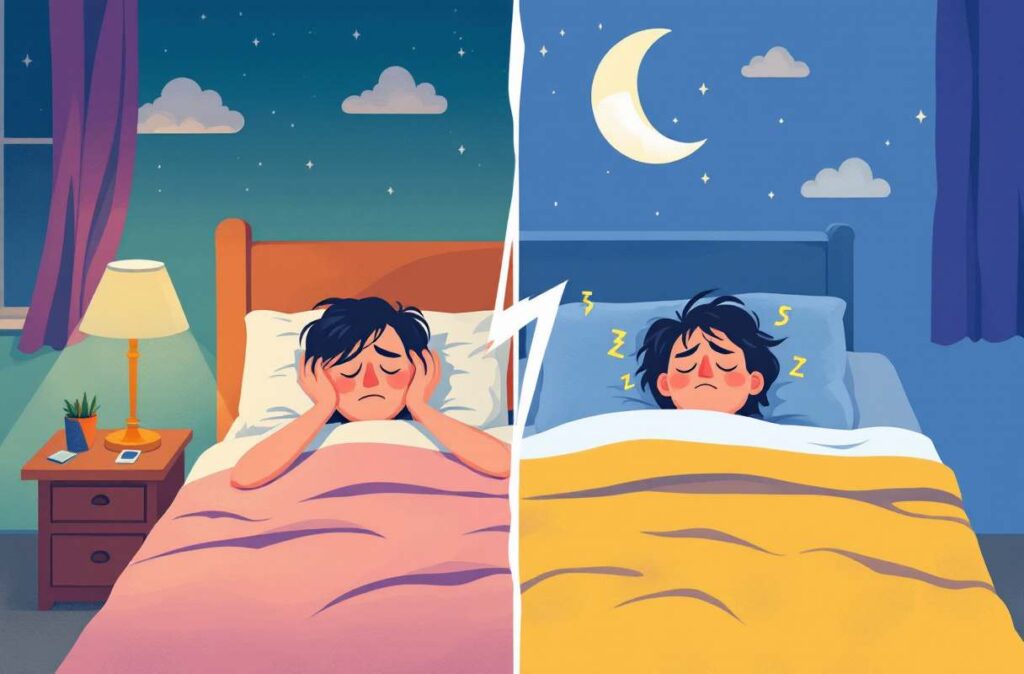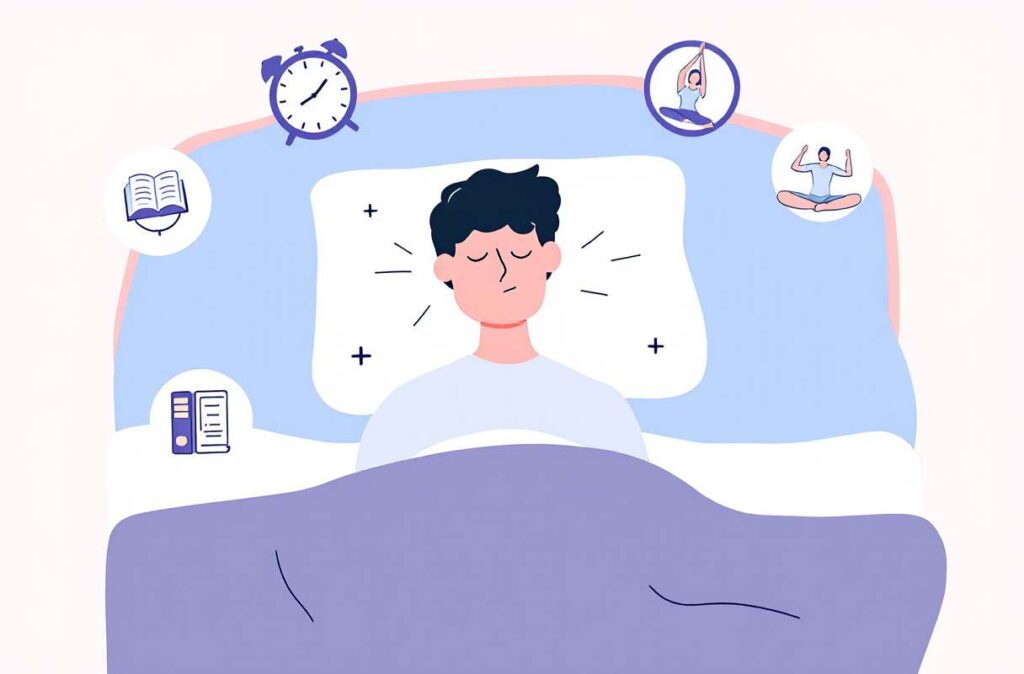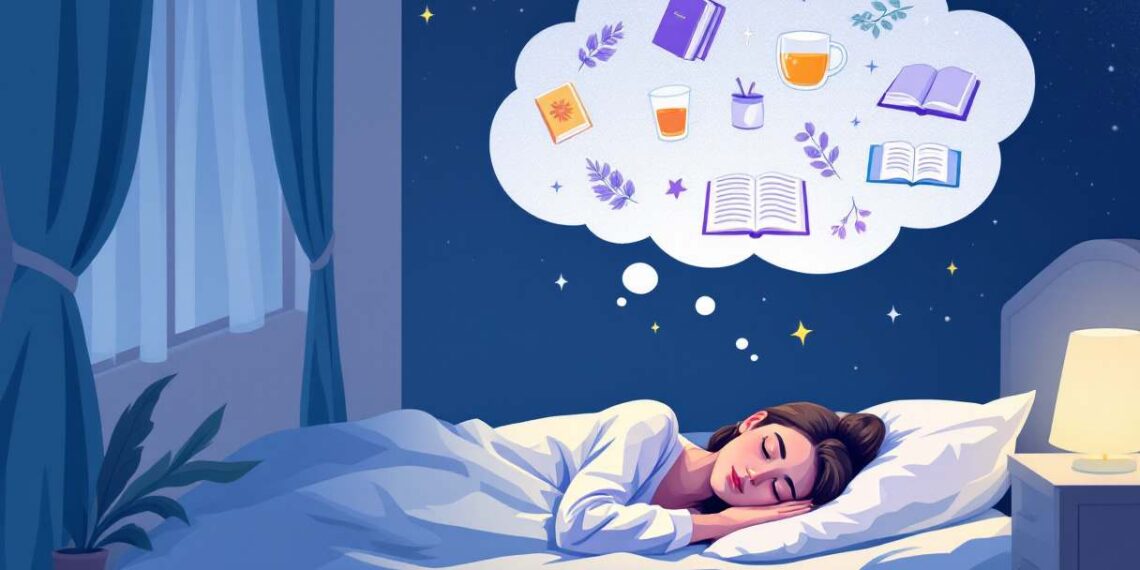Ever found yourself staring at the ceiling at 3 AM, counting sheep that seem to multiply instead of lulling you to sleep? Welcome to the world of insomnia, where rest feels like a distant dream and mornings arrive far too soon. In our fast-paced, always-on society, sleepless nights have become an unwelcome bedfellow for millions. But fear not, fellow night owl! Whether you’re tossing and turning occasionally or battling chronic sleeplessness, understanding insomnia is the first step toward reclaiming your nights. Let’s dive into the world of sleep struggles, unravel the mysteries of insomnia, and discover how you can finally catch those elusive Zs.
Unraveling Insomnia
Getting a handle on insomnia starts with breaking down its definition and the flavors it comes in. This info sure helps out those in the sleep-deprived camp looking for ways to catch some zzz’s.
Defining Insomnia
Imagine tossing and turning like a restless pancake. Insomnia means wrestling with drifting off, keeping the sandman close, or waking up before the sun—and not managing to snooze back. This can leave folks dragging through the day, cranky as a bear, messing up their mojo and health. People stuck in this rut might wonder, how long insomnia lasts. Spoiler alert: It varies, making it an even trickier beast.
“Sleep is the golden chain that ties health and our bodies together.” – Thomas Dekker
Common Types of Insomnia
Insomnia sits in a few buckets depending on how long it sticks around and what’s egging it on. Here’s a cheat sheet of common types:
| Type of Insomnia | Description |
|---|---|
| Acute Insomnia | Quick and dirty sleep troubles, usually sparked by stress or big life changes. Hangs around a few days or weeks tops. |
| Chronic Insomnia | Those sleep woes that crash the party at least thrice a week for three months or more. Could be bad company like health woes, poor routines, or mental roller coasters. |
| Onset Insomnia | Can’t clock out at bedtime? Anxiety or worry might be your late-night buddy. |
| Maintenance Insomnia | Your snooze button’s got a bug—you’re up too often at night. Maybe stress or noise is waving red flags. |
| Early Morning Awakening Insomnia | Getting up with the roosters, but not by choice. Often rodeoing with depression or anxiety. |
Figuring these types out unlocks the secret code to personal sleep puzzles. Plenty of gremlins like stress and anxiety, lifestyle quirks, and meds can play a role. Being hip to these can steer folks toward finding the right fixes. For ideas on improving sleep vibes, peek into the sleep hygiene checklist or get moving with exercise for insomnia.

Factors Contributing to Insomnia
Getting a grip on what keeps you up at night can be a game-changer. There are a few key areas to keep an eye on: stress and anxiety, how you’re living your life (lifestyle habits), and whatever meds you might be popping.
Stress and Anxiety
These two sneaky devils are often the main reasons folks toss and turn. Stress from the daily grind, your personal life, or big changes can crash the chill vibes needed for sleep. Anxiety kicks that little worry hamster into overdrive, making it feel like your brain’s running a marathon instead of gearing down for rest.
| Stress Type | Sleep Jammer |
|---|---|
| Work stress | Can’t switch off |
| Personal troubles | Endless worrying |
| Anxiety | Brain buzzing all night |
If nights are filled with more toss than zzzs, peek at our insomnia vs anxiety for some light bulb moments.
Lifestyle Habits
How you roll day-to-day messes with sleep a whole lot. Dingy sleep habits can totally mess with your zzzs. Crazy sleep times, staring at phone screens, too much coffee or booze, and skipping your daily move can all throw a wrench in your snooze routine.
| Habit | Sleep Drama |
|---|---|
| Weird sleep times | Body clock confusion |
| Bedtime screens | Sleep kick-off delay |
| Loads of caffeine | Fidgety nights |
| Zero exercise | Poor snooze quality |
Want to tweak your habits for better dreams? Skim our sleep hygiene checklist for some friendly tips.

Medication Side Effects
Medications can be double-edged swords for sleep. Some prescriptions or over-the-counter stuff, even supplements, might mess with your shut-eye scene. Usual culprits include meds like antihistamines, antidepressants, and any jazzed-up stimulants.
| Meds Class | Sleep Shuffles |
|---|---|
| Antidepressants | Sleep wonkiness |
| Stimulants | Sleepless vibes |
| Corticosteroids | Wide-awake syndrome |
If your meds are tripping up your sleep, having a chat with your healthcare pal is always a smart move. Curious about busting the insomnia cycle? Swing by our guide on how to break the insomnia cycle.
Spot these sleep blockers and you’ll be on your way to a snooze-friendly zone that swaps restless nights for sweet, restoring sleep.
Understanding the Duration of Insomnia
There’s a sleep issue called insomnia, and it comes in two flavors: short-term or long-term. Knowing which type you’re dealing with is the first step towards getting better shut-eye.
Acute Insomnia
Short-term or acute insomnia is like that annoying relative who drops by unannounced but doesn’t stick around too long. It hangs around for a few days to a couple of weeks. Usually, it gets kicked off by something like major life twists, emotional stress, or a sudden anxiety flair-up. Sometimes even traveling or changing jobs can throw your regular sleep habits into a spin.
Here’s a quick snapshot to help you spot acute insomnia:
| What’s Going On? | Details |
|---|---|
| Sticks Around | A few days to a few weeks |
| It’s Because of | Life upheaval, temporary jitters |
| How It Feels | Can’t fall asleep or stay in dreamland |
| Bounces Back | Often just clears up with some TLC and stress-busting |
Chronic Insomnia
Then, there’s chronic insomnia, which doesn’t know when it’s overstayed its welcome. If you’re having sleep woes at least three times a week and it’s been dragging on for three months or more, you’re dealing with the chronic sort. This tough customer can be thanks to ongoing stress, anxiety that just won’t quit, chronic pain, or hidden health issues. Daytime drowsiness and mood swings might be regular guests, too.
Take a glance at what makes chronic insomnia tick:
| What’s Going On? | Details |
|---|---|
| Sticks Around | Persistently, three times a week for over three months |
| It’s Because of | Long-standing stress, anxiety, health issues |
| How It Feels | Consistent trouble hitting the hay or staying asleep |
| Bounces Back | Might need a helping hand from therapy or meds |
If chronic insomnia is your shadow, consider tackling it with tools like cognitive behavioral therapy, getting into mindfulness, or giving your bedtime routine a makeover. Our sleep hygiene checklist has some handy tips, too.
Grasping the fine line between acute and chronic insomnia helps you nail down what’s messing with your Zzzs and opens up the route to finding what suits you best for a good night’s rest.
Insomnia in Different Groups
Everyone wrestles with sleep troubles now and then, but some folk have extra hurdles to clear before catching those much-needed Zs. Let’s break down how insomnia toys with different groups and how they might kick it to the curb.
New Parents
New parents know all about sleep disruption, with their tiny humans demanding attention at all hours. Endless waking for diaper duty, feeding, and soothing can steal that precious sleep, making insomnia a too-familiar buddy. Research highlights new parents losing substantial sleep in those facepalm-early months.
| Situation | Sleep Impact |
|---|---|
| Baby’s Nighttime Needs | 2-3 hours less snooze time |
| Feeding Frenzies | Extra wake-ups galore |
| Parental Worry | Fuels insomnia woes |
If you’re in the newborn club, consider planning nap times and divvying up duties to grab rest when you can. For more tips, check out our piece on breaking the insomnia cycle.
Shift Workers
Folks on shift work, like night owls, often have body clocks that feel a bit haywire. Their natural sleep-wake cycle gets all scrambled, leading to chronic insomnia struggles.
| Work Hours | Usual Sleep Length |
|---|---|
| Night Shifts | Roughly 4-6 hours |
| Rotating Schedules | Around 5-7 hours |
| Daytime Work | About 6-8 hours |
With sleep all over the place, fatigue and staying awake can become a real grind. Practicing solid sleep habits, like making the bedroom dark and quiet, can make a world of difference.
Older Adults
Aging can throw a wrench in sleep rhythms, often making it harder for seniors to nod off or stay asleep. Conditions and meds can complicate things further, amplifying insomnia.
| Age Bracket | Typical Sleep Feel |
|---|---|
| 65-74 | 6-7 hours, lots of waking up |
| 75+ | 5-6 hours, challenges with deep sleep |
Older folks should keep tabs on medicine side effects and chat with doctors if sleepless nights drag on. Getting in some exercise might just boost those nighttime sleep vibes.
By understanding how insomnia plays out in these different groups, people can find nifty solutions and snatch back a restful night’s sleep.
Strategies for Managing Insomnia

Tackling insomnia is like a complex puzzle. It takes some mixin’ and matchin’ of healthy habits, soothing techniques, and good old-fashioned relaxation. Here’s the lowdown on some nifty strategies to try.
“The best bridge between despair and hope is a good night’s sleep.” – E. Joseph Cossman
Sleep Hygiene Tips
Getting in the zone for sleep is crucial. Let’s talk about some basics:
- Set a Routine: Hit the sack and rise up at the same time daily. This helps your body’s internal clock stay on track.
- Create a Cozy Den: Transform your bedroom into a sleep paradise. Dark, quiet, and cool are the magic words. Maybe think about these blackout curtains for dreamland or those white noise gadgets for extra chill.
- Cut Down on Caffeine and Booze: Less coffee and alcohol, especially before bed, can mean better snoozing.
- Chill Out Activities: Wind down with a good book or a nice warm bath. These relaxing rituals get your body in sleep mode.
Here’s a handy-dandy checklist to keep you on track:
| Sleep Hygiene Tips | Description |
|---|---|
| Consistent Sleep Schedule | Sleep and wake at the same time each day. |
| Comfortable Sleep Environment | Aim for a dark, quiet, and cool sleeping space. |
| Avoid Stimulants | Say no to caffeine and alcohol near bedtime. |
| Relax Pre-Sleep | Get into calming activities before bedtime. |
If you want the full scoop, take a peek at our sleep hygiene checklist.
Cognitive Behavioral Therapy for Insomnia (CBT-I)
CBT-I might sound fancy, but it’s just a smart plan to kick those pesky sleep problems to the curb by adjusting your thoughts and habits. It’s especially good for long-term insomniacs. Here’s the breakdown:
- Sleep Restriction Therapy: Cheesily enough, this is all about spending less time in bed to make your sleep more efficient. Curious? Check out our guide to sleep restriction therapy.
- Stimulus Control: This is about saving the bed for sleep and, erm, certain other activities only. No TV binges here!
- Cognitive Restructuring: We’re about flipping any unhelpful beliefs about sleep on their heads, and easing that insomnia anxiety. Read more how CBT-I works in our detailed article.
Relaxation Techniques and Mindfulness
Relaxation and mindfulness can calm the nerves and help make drifting off easier. Here’s a few techniques:
- Meditation: Meditation can help clear the ol’ noggin before bed. For tips, peek at our piece on meditation for sleep.
- Deep Breathing: Breathe deep and let the tension melt away. Do it whenever, but it’s especially helpful before bed.
- Progressive Muscle Relaxation: Tense up, then let go. It takes care of that physical stress.
Want to add some workout to your mix? Check out exercise for insomnia—gentle exercises can seriously boost your sleep and well-being.
With persistence, anyone wrestling with insomnia will find their happy place. Everybody’s different, so find the combo that fits you just right. Sweet dreams!
Seeking Professional Help
If tossing and turning has become your nighttime hobby, it might be time to call in the experts. A healthcare provider can help you reclaim your sleep and make those sleepless nights a thing of the past.
Consulting a Healthcare Provider
Doctors aren’t just for colds and flu. They’re also your sleep squad! If you’re struggling with insomnia, they’re the folks to help figure out what’s keeping those eyelids wide open. They’ll take a look at how long you’ve been burning the midnight oil, any weird symptoms you’re experiencing, and lifestyle quirks that might be messing with your Zs.
Before your appointment, play detective and keep a sleep diary. Jot down when you hit the hay and when you rise with the sun. Capture details like how many sheep you counted before dozing off, how often you wake up, and anything that might be killing the vibe. The doctor will probably quiz you about your day-to-day routine, stress levels, or what pills are in your medicine cabinet. Curious if your insomnia’s just anxiousness in a sleep mask? Check out our article on insomnia vs anxiety for the scoop.
Medical Treatments for Insomnia
When the basics like tweaking sleep habits don’t cut it, more specialized treatments might come into play. Here’s the lowdown on possible paths to peaceful slumber:
| Treatment Type | Description |
|---|---|
| Prescription Medications | Doc might hand out meds to either coax you into sleep or chill you out some. These are typically for short, sweet bursts. |
| Cognitive Behavioral Therapy for Insomnia (CBT-I) | It’s like a gym for your brain, kicking insomnia-inducing thoughts and habits to the curb. Learn more in our piece on does cbt-i work. |
| Sleep Restriction Therapy | Fancy talk for trimming your bed time to boost the sleepy vibes. Curious? Our article on sleep restriction therapy spills the beans. |
A doc visit can also open doors to mixing up your treatment game. You might hear them chat about blending in some exercise for insomnia, chilling with meditation for sleep, or munching on foods that help you sleep. Keeping the convo going with your healthcare provider means they can tailor the treatment just for you.
Joining forces with a pro to tackle insomnia not only helps reveal the mystery of how long does insomnia last, but also brings back those sweet nights of proper rest.
As we’ve journeyed through the landscape of sleepless nights, from defining insomnia to exploring its various faces and solutions, one thing becomes clear: restful sleep isn’t just a luxury—it’s a necessity for our physical and mental well-being. Whether you’re a new parent navigating midnight feedings, a shift worker battling a topsy-turvy sleep schedule, or simply someone who’s been counting too many sheep lately, remember that you’re not alone in this struggle. Insomnia may be a formidable foe, but armed with knowledge about sleep hygiene, relaxation techniques, and professional help options, you’re well-equipped to reclaim your nights. So, tonight, as you lay your head on the pillow, take a deep breath and know that better sleep is within reach. Sweet dreams aren’t just for fairy tales—they can be your reality too. Here’s to unraveling insomnia and weaving a tapestry of restful nights ahead!
FAQs
Q1: How long does insomnia typically last?
A1: The duration of insomnia varies. Acute insomnia can last from a few days to a few weeks, while chronic insomnia persists for three months or more, occurring at least three nights per week.
Q2: Can insomnia be cured completely?
A2: While insomnia can be effectively managed and often resolved, it’s not always “cured” in the traditional sense. Many people find long-term relief through a combination of lifestyle changes, therapy, and sometimes medication.
Q3: Is it safe to use over-the-counter sleep aids for insomnia?
A3: Over-the-counter sleep aids can provide short-term relief but aren’t recommended for long-term use. They can have side effects and may lead to dependence. Always consult a healthcare provider before starting any sleep medication.
Q4: How does exercise help with insomnia?
A4: Regular exercise can improve sleep quality by reducing stress, anxiety, and depression. It helps regulate your body’s circadian rhythm and can increase the amount of deep, restorative sleep you get.
Q5: Can certain foods help improve sleep?
A5: Yes, some foods can promote better sleep. Foods rich in tryptophan (like turkey, milk, and nuts), magnesium (like leafy greens and whole grains), and melatonin (like cherries and bananas) may help improve sleep quality.
Additional resources and authority
- National Sleep Foundation: “Insomnia” –
- Mayo Clinic: “Insomnia – Diagnosis and treatment“
- American Academy of Sleep Medicine: “Insomnia – Overview and Facts“








